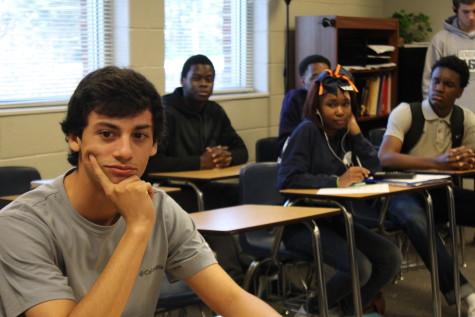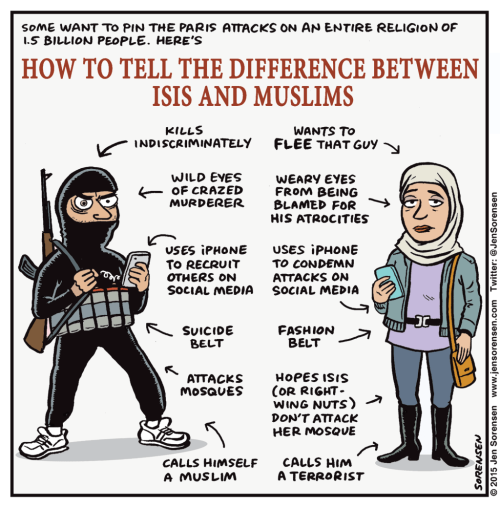I am not a terrorist
December 9, 2015
Quiet streets and dimmed lights spiraled the city. People stayed tucked away in tiny shops unaware of the tragedy that would soon occur. A particularly loud and unusual boom shattered the silent sky. Windows blew, buildings fell, and the unusual bearded man that stood in the middle of the street vanished. Suddenly, dark clouds and debris polluted the peaceful night air.
In the wake of yet another malicious terrorist attack, vicious arguments against the morality of Muslims and the Islamic religion in its entirety have been proposed. Though the prevalence of Islamic extremism remains small, the entire religion receives criticism for the actions of one group.
Often described as brutal and belligerent, people lazily point fingers and stereotype Islam as the most violent religion. Despite a few minor differences, Muslims share the same basic beliefs as many other major religions including Judaism and Christianity. Muslims built Islam upon the idea of peace.
In fact, the word Islam derives from an Arabic word meaning peace. To claim all believers in the Islamic faith act as militant and inhumane as ISIS, seems a cruel and insensitive accusation. Not all Muslims are terrorists, and not all terrorists are Muslims.
Envision a terrorist. Someone might picture something along the lines of an armed dark skinned man shouting “allahu akbar” through his scruffy beard. Several NC students match the image perfectly. These students equate Muslim to terrorist.
When asked what a terrorist was, senior Molly Lauth simply said, “mean people that cause terror, like ISIS.” These obscured understandings of the word’s meaning lead to even more misguided thoughts and views about who to pin as a terrorist. The textbook definition says: a person who advocates violence in order to achieve political gains. Using tactics to instil fear, these leaders pollute the beliefs of young children and weak minded citizens with their own twisted views. Pushing followers beyond their limits, terrorists force people to sacrifice naysayers’ lives.
“A terrorist isn’t defined as Muslim. These are people who take their religion to the extreme,” senior Jacob Drobney said.
Terrorism’s definition reads not as a single group or religion, nor associated with a single person’s name. With the right motivation, anyone can terrorize.

Though often denied, students separate themselves from several of their peers because of their appearance and beliefs. Common bias opinions against specific religious exists almost everywhere.
Five basic pillars founded Islam: Only one true God (Allah), prayer, giving Zakat or supporting the needy, fasting during Ramadan as a method of spiritual self-purification, and the pilgrimage to Mecca. Around 1.6 billion people practice variations of the Quran, meaning Muslims make up 33% of the entire world’s population. A mere 6% of these Muslims are claimed terrorists.
Though the religion’s divisions include vastly different perceptions of their teachings, the Quran itself emphasizes nonviolence as important and strictly condemns actions like those carried out by ISIS. The Quran states, “You may fight in the cause of God against those who attack you, but do not aggress. God does not love the aggressors,” (2:190).
The Quran teaches the following concepts: the Quran is the perfect word of God [15:9], there is only one true God [4:171-172], Jesus is not God [5:72], there is no original sin [2:36-37] and Jesus did not die on the cross or rise from the dead [4:157-158]. Although their teachings developed during incredibly violent times, the religion emerged in order to create peace by men trying to build and keep societies in order. Some people will always interpret the Quran’s teachings differently and use them to inspire violence, but this remains true for any religion.
Over time, history presents numerous acts of terrorism from all religions, cultures, and races. Groups such as Boko Haram, ISIS, and the Haqqani Network dominate the Eastern hemisphere, but unfortunately do not stand as the only ones. Though several terrorist organizations scatter themselves throughout the entire world, ISIS remains the most referenced and well-known group.
Like all religions, followers practice variations, and in their case with the Quran, indefinitely tying all Muslims to the ISIS name. So, what does this mean for non extremist Muslims? If someone fit the profile, they fit the name. Regardless of what they claim belief in, they are all marked with a red flag.
After the traumatic results of September 11, 2001, seemingly the entire nation shamed and questioned any person of middle eastern descent. The FBI executed extensive background checks on every Muslim in the United States. Suddenly, they became the kind people to make you cross to the other side of the street. Should a nation single out an entire religion based on the actions of one group? Thoughtless jokes made against Muslim students have become the norm. Though seemingly harmless, these jokes perpetuate harmful stereotypes. This discrimination appears pervasive..
 Courtesy of the Buffalo News and Adam Zyblis
Courtesy of the Buffalo News and Adam Zyblis
“I think it’s present everywhere. I mean, we make fun of people all the time just because of the way they look. People just don’t take it seriously,” senior Melissa Hines said. Many students and people find it easy to point fingers at Muslim after terrorist attacks. People who prove ignorant on the topic of ISIS, terrorism and Islam, start the violence portrayed against Muslims.
In response to recent hate crime and bullying against Muslims, YouTubers AsoOmii Jay, Younis, Mustafa and Maz teamed up and created the Blind Trust Project. The team walked the streets of Toronto searching for the perfect spot to set up. They blindfolded one of their friends and placed two signs next to him. They read: “I am a Muslim. I am labeled as a terrorist. I trust you. Do you trust me? Give me a hug.”
The response was touching and inspiring. An endless stream of people lined up to hug and speak to the blindfolded Muslim. Shortly after, the video became a hit on several social media sites. Videos similar to The Blind Trust Project began to spiral the internet. Suddenly people became much more aware of the fight Muslims have against the media and the public eye everyday.
 Courtesy of Jen Sorensen
Courtesy of Jen Sorensen
Fortunately, this was not the only attempt to spread the word. Groups such as the Active Change Foundation fight to separate themselves from the ISIS name too. British Muslims apart of the ACF created the hashtag #notinmyname. The organization attempts to share their views and opinions against ISIS. Tweets coming from all over the world incorporate this hashtag as well as a photo or video sharing a reason why ISIS does not represent them. See how hundreds of people fight to protect their religion by searching the hashtag #notinmyname or visit the Active Change Foundation website here.
For centuries, the Muslim population has received criticism for the actions of a single group. Out of an astounding 1.6 billion people, 94% fully disagree with the actions of these terrorists. Crimes against Islamic ideals will continue to occur until the entire nation becomes willing to separate the two very distinct names.
Despite their spurious name, ISIS does not represent the religion of Islam.
The world must come to terms with the fact that some people will always commit acts of violence and hate in the name of religion. In times like this where religion becomes controversial, people must remind ourselves that these misguided few do not represent the whole.
